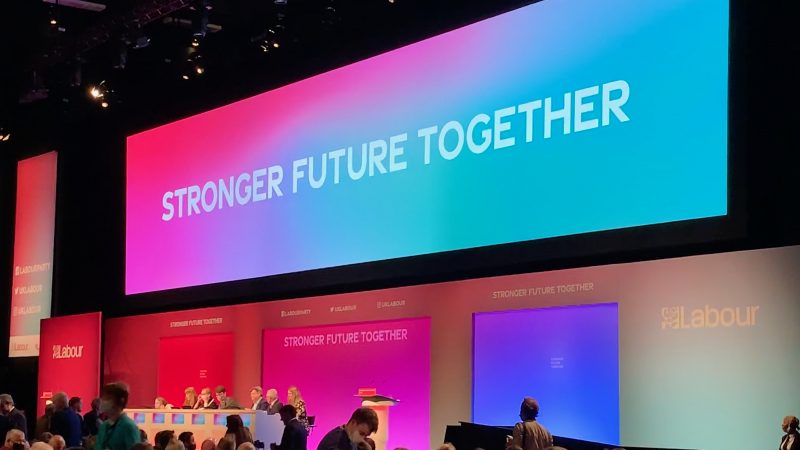
Hello, LabourList readers! My Sunday started bright and early. The conference arrangements committee (CAC) report was released just after 8am, with the results of Saturday’s votes. These were a mixed bag. In general, the conference had voted along national executive committee (NEC) recommendations. But in two votes the Constituency Labour Party (CLP) section voted for members’ rule changes against NEC wishes, and in one of those votes conference as a whole ignored the NEC recommendation and voted for a rule change on parliamentary selections. This will guarantee that local parties can control their candidate selections in by-elections and snap elections.
The first big speech was from Ed Miliband. It was his first at party conference since stepping down as leader in 2015. He revisited some of the key themes of his leadership, like the “cost of living crisis”, and told us that he had returned to frontline politics to take on the biggest issue of our era: climate change. I was struck by how much more left-wing his speech was than any I remembered from his leadership. He emphasised the need for public ownership and a “people’s dividend” from a Green New Deal.
We then discussed motions on a Green New Deal, Community Wealth Building, High Street and Business Recovery, and Public Ownership. There were two Green New Deal motions because the compositing meeting on Saturday evening had not reached a consensus. The key difference was that one version, supported by the GMB, would commit us to nuclear power and “green gas”, whereas a motion supported by the bulk of CLPs and other unions did not. A number of fantastic young delegates gave speeches in favour of the latter one. Conference passed all the policies with big majorities, except for the GMB motion, which went to a card vote and then passed too.
This debate was interspersed with videos from our sister parties across Europe. We heard from the Spanish Socialists, who are currently in government with support of the radical left party Podemos. We then heard from the Norwegian Labour Party. They just had an election where they lost one seat but expect to form a government nonetheless, thanks to the support of smaller left parties. Finally, we heard from the German Social Democrats on the same day that they contested their federal election. They too hope to form a government, and they too will need the support of left parties to do so. It strikes me that there’s a lesson here for the Labour Party. We don’t have major parties to our left but we do have a left wing inside the party. If we want to win then we need to make sure that we value and promote this wing, not try to shut it down.
The biggest debate was over another set of constitutional amendments. Unlike the previous day, when all rule changes were discussed together, this time we discussed one on the party’s response to the EHRC report separately. It wasn’t clear why. This rule change called for the creation of two new bodies: the independent review board (IRB) and independent complaints board (ICB). Both would deal with complaints regarding protected characteristics (e.g. race and gender). Most speeches were in favour, and emphasised the need to challenge antisemitism. The speeches against the change argued that these committees would not be independent because they are ultimately appointed by the general secretary, a post currently filled by the controversial David Evans. Frustratingly, while some asserted that this would not undermine the independence of the committees, nobody explained why.
The rest of the debate was on three other rule changes. One was on disciplinary processes, the second was to limit the number of motions debated at party conference and the third was the much-anticipated change to the leadership election rules. The bulk of the debate focused on the last of these three. Its supporters claimed that increasing the threshold for MP nominations from 10% to 20% would make the party “election-ready”, whereas its critics argued that it would stifle debate, undermine democracy and make our movement weaker. I was fortunate enough to be called to speak, and I spoke against the proposal.
These proposals would weaken our movement, narrow our debate and limit the diversity of our leadership.
I hope #Lab21 vote them down. https://t.co/6TedpooVuk
— James McAsh (@mcash) September 26, 2021
There is a new chair for each section of conference and they all have a different approach. This one was chaired by Mark Ferguson from UNISON. He was much more interventionist than previous ones. He would frequently tell us which speakers he agreed and disagreed with and generally refused to accept procedural motions. The latter was particularly odd. At one point he said that he wouldn’t accept any because he “could not imagine what they could be”.
Procedural motions are the way that the conference can challenge the decisions of the chair, so denying them on these grounds feels a little hubristic. The one procedural motion he did accept was submitted by me: I argued that the results of the last hand vote had been unclear to most of us on the conference floor and that it would give us more confidence in the decision were it put to a card vote. He refused, saying that we did not have time. But this argument was undermined by his next action, which was to move to a card vote on four other issues. Adding a fifth would not have taken much more than ten seconds.
That was the end of the conference day. Delegates filed out to find fringe meetings with free food, or to enjoy a well-deserved drink. Two days down, three to go.




More from LabourList
‘Tackling poverty should be the legacy of Keir Starmer’s government’
‘The High Court judgment brings more uncertainty for the trans community’
‘There are good and bad businesses. Labour needs to be able to explain the difference’